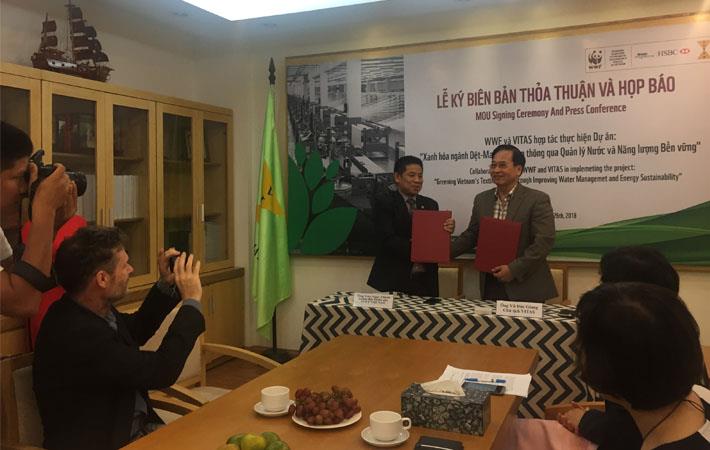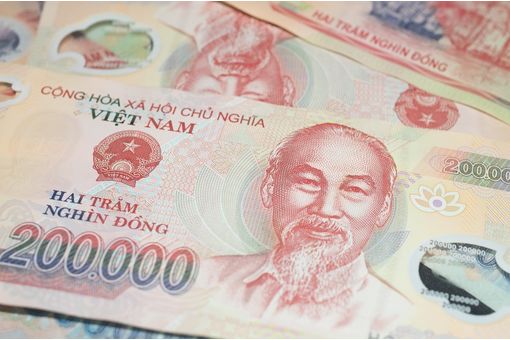VITAS, WWF partner for eco-friendly textiles industry

The project titled 'Greening Vietnam’s textile sector through improving water management and energy sustainability' is part of the 'Driving impact reduction through the textiles value chain' project sponsored by HSBC to support the green textile industry in China, Bangladesh, India and Vietnam. The 'Driving impact reduction through the textiles value chain' belongs to pillar Sustainable Network and Entrepreneurs, one of three pillars under HSBC’s current sustainability strategy aiming at supporting the shift to sustainable global supply chains.
With a vision to transform the textile-apparel sector in Vietnam, the project will be implemented from 2018 to 2020, the project will be implemented from 2018 to 2020. It will achieve this through engaging the industry and influencing environmental governance in order to bring social, economic, and conservation benefits to the country. Geographically, the project will focus on the Mekong and Dong Nai deltas where more than half of Vietnam’s apparel factories are located, WWF said in a press release.
"Vietnam ranks as the fifth largest exporter of apparel goods in the world, but our industry is more famous for low cost production with limited environmental standards. With customers worldwide now more conscious about the environment, this is forcing a lot of global brands to change their operations to include higher environmental and social standards. If we do not change our practice now, Vietnam could lose its competitiveness. That is why this project is so important and timely," said Vu Duc Giang, chairman of VITAS.
The main focus of the project is to improve water and energy sustainability within the sector, thus reducing its impacts to the environment. The project will also work with textile–apparel manufacturers to encourage them to be more active river stewards, practice sustainable energy planning and discuss collective actions to achieve long term sustainable investments and development in the textile-apparel sector.
One important target of the project is influencing Vietnamese textile investors to implement more sustainable practices. The Chinese textile investors who have in the past increased their foreign direct investment in Vietnam’s textile –apparel sector will engage in the project and share their own lessons.
"HSBC has strong determination to preserve the environment and support green businesses. As Vietnam is more and more integrated in the world through FTAs like CPTPP, EVFTA, bilateral free trade agreements, FDI inflows are forecasted to continue to be robust, and textile and garment, one of the top export industries, is the one that will benefit. However, Vietnam’s enterprises are required to considerably raise their ethical and environmental standards to align with the world business’s community or lose out in global competition. As the world’s leading international bank, HSBC is committed and proud to be the contributor to the greening of Vietnam’s textile and garment sector, a very important sector in term of social, environmental and economic impacts, in the next chapter of international trade," said Pham Hong Hai, CEO of HSBC Vietnam.
"For WWF, greening the textile sector in Vietnam is also a means to achieve our wider goal of addressing river governance and energy sustainability, which are top global environmental concerns. In the long run we want to see factories, industrial parks and other actors come together to take more proactive collective actions to address risks and impacts beyond their factory fences and more responsibly manage shared resource uses across-sectors," Marc Goichot from WWF-Greater Mekong. "With more than 10 years of working with the textile industries of top exporting countries as Bangladesh, China, India and Pakistan, WWF believes that we can help Vietnam to create a big positive change for the sector."
Key stakeholders in the project include international brands with suppliers in Vietnam, factories around the country, in particular in the Mekong and Dong Nai delta in areas around Ho Chi Minh City, financial institutions, development partners and other relevant initiatives. Other partners include stakeholders outside Vietnam such as China National Textile and Apparel Council and Lancang-Mekong Cooperation. (RR)
Fibre2Fashion News Desk – India
































-Ltd..jpg?tr=w-120,h-60,c-at_max,cm-pad_resize,bg-ffffff)





.jpg?tr=w-120,h-60,c-at_max,cm-pad_resize,bg-ffffff)
.jpg?tr=w-120,h-60,c-at_max,cm-pad_resize,bg-ffffff)






